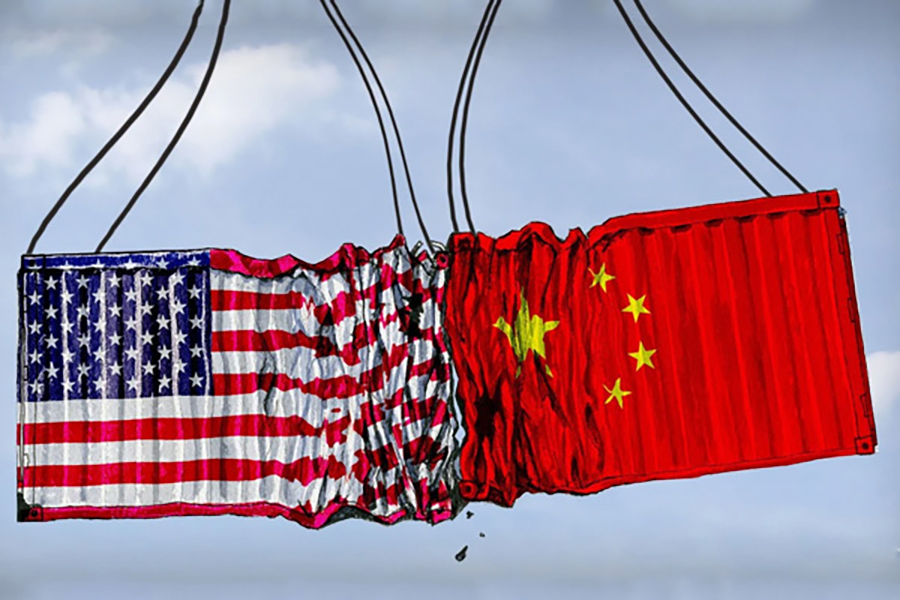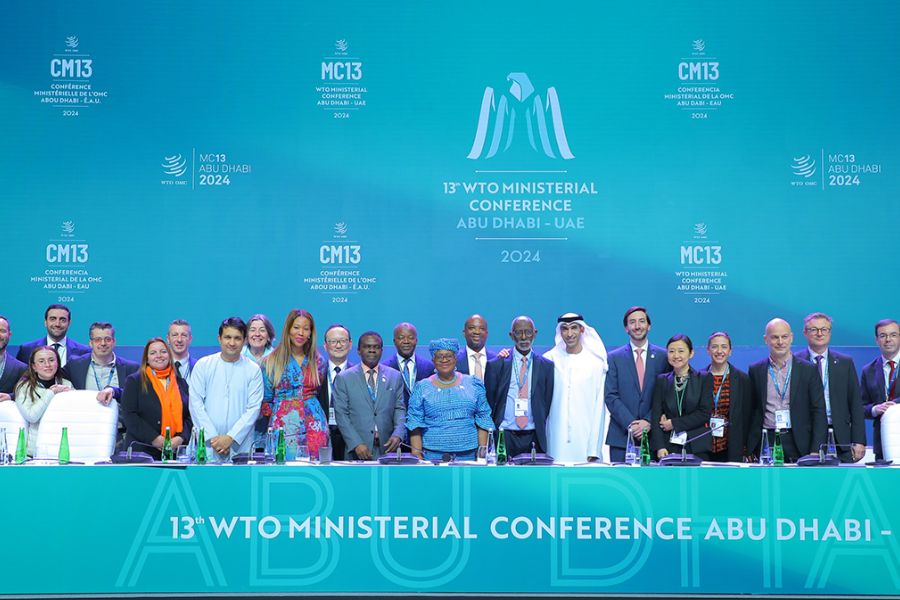WTO Ministerial 2020: Just another lost battle?
• The 12th Ministerial Conference (MC) of WTO is scheduled for June 8-11, 2020 in Kazakhstan. Several issues related to protectionist measures, digital trade, fisheries subsidies, environmental goods, standardization and implementation of SPS, investment facilitation, etc are expected to dominate the Ministerial.
• The failure of the 11th Ministerial Conference of the WTO in December 2017 in Buenos Aires had left many trade analysts questioning if this is the beginning of the end for the WTO.
• One of the key objectives is to break the deadlock on certain issues and prepare a common ground to revive the mandate of the global trade body. India is seeking amendment of laws on unilateral action by members on trade issues and resolution of the WTO’s dispute settlement system.
• The world cannot afford another failure of talks at the 12th Ministerial Conference, considering that the WTO already faces a highly uncertain future.

World Trade Organization (WTO) is the apex body for setting the rules of international trade. In its past two & half decades, it has facilitated in reducing barriers to trade in both goods and services and created a dispute resolution system that cohorts say has reduced the threat of trade wars. However, the institution is under considerable pressure. Negotiations on a comprehensive development agenda have floundered on disagreements over agricultural subsidies and intellectual property rights, while members have increasingly turned to separate bilateral and regional free trade agreements to advance their trade interests.
The Argument of “coming back to square one” might not be wrong in the context of WTO’s sanctity, going by the previous outcomes of WTO ministerial meetings especially Nairobi and Buenos Aires. In substituting the General Agreement on Trade and Tariffs (GATT), the World Trade Organization’s (WTO) purpose was to balance trade conditions and create an impartial trade environment for goods and services and the free flow of trade. Aligning structural imbalances in multilateral commerce in an asymmetrical economic environment was pivotal.
The failure of the 11th Ministerial Conference of the WTO held in December 2017 in Buenos Aires to complete any new multilateral or additional agreements or even to approve on the traditional declaration concluding the conference has left many of trade analysts questioning if this is the beginning of the end for the WTO.
E-commerce was on the WTO agenda since the second ministerial conference held in Geneva in 1998, where it was agreed to establish a work programme to examine all aspects of global e-commerce with a particular focus on the relationship between e-commerce and the existing WTO agreement. E-commerce generated considerable debate on the fringes of the conference. Many NGOs were strongly opposed to the idea of negotiations, concerned about what they see as a push by dominant global (primarily American) technology companies to lock in place regulations that allow them unfettered access to data, which can then be processed and exploited for profit.
Several issues related to protectionist measures, digital trade, fisheries subsidies, environmental goods, standardization and implementation of SPS, investment facilitation, and other issues, which are ripe for negotiations and agreement are expected to dominate 12th WTO MC happening this year. By taking a plurilateral approach toward multilateralism, the members of the WTO can ensure that this is the end of the beginning.
India had appealed to the WTO members to identify common ground for strengthening the multilateral trade body amid challenges being faced by it following the deadlock at the Buenos Aires ministerial meet.
Is history repeating itself?
The main reason due to which GATT was replaced was the tussle between economies over trade interests, as developing economies and LDCs were unable to get market access in most of the developed countries, especially for agricultural commodities. Since developed countries were influential while negotiating from 1947 to 1979, developing economies & LDCs had little bargaining power. The deadlock on agricultural trade negotiations hasn’t moved much, be it in the late 1980s or in 2017. We can recall that there has been a tussle between rich countries like EU and US on one hand and the developing countries like Malaysia, Brazil and India on the other hand to discipline the farm regime in the WTO in their favour.
A majority of the world’s poorest nations depend on exporting elementary and unprocessed agricultural products but struggle to compete against richer nations that support their farmers with subsidies. The Organization for Economic Cooperation and Development (OECD) estimates that these subsidies total nearly ranging from US$ 300-325 billion annually. Trade economists say that agricultural lobbies in the United States, Europe, and Japan have steadily exercised their substantial political clout to influence lawmakers to maintain such subsidies.
Moreover, the cost of adapting tough and stringent non-tariff barriers designed by these developed countries exacerbate the situations of non-developed countries. All these measures augment to the cost of trading for all exporters. However, the costs of acquiescence with many of these measures are asymmetrical across exporters because compliance depends on production facilities, technical know-how, and an infrastructural base that, while usually available in developed and emerging markets, is often lacking in LDCs and many of developing economies. The presence of NTMs often makes LDCs exporters unable to compete in international markets. Moreover, the presence of NTMs is particularly large in sectors of fundamental importance for LDCs in terms of growth potential, such as textile and apparel and many agricultural sectors.
Since last two WTO ministerial conference was unable to turn fruitful outcome, they are trying to gear up by having a warm up session. One of the key objectives is to break the deadlock on certain issues and prepare a common ground to jolt the mandate of the global trade body. India is seeking an amendment of laws on unilateral action by members on trade issues and resolution of the WTO’s dispute settlement system. This talk will offer an opportunity to involve in free and candid discussions with the expectation that it will lead to policy guidance on a number of issues including protectionism, e-commerce, food security & subsidies. If the situation of LDCs and developing countries are not ameliorated, ceteris paribus (other things remaining equal), all these jargons, convoluted WTO negotiations and heavy dictums becomes trivial at present and even in future.
Source: World Development Indicator, World Bank
From Failure to Future
Safeguarding and strengthening the multilateral trading system became significantly germane today, and the WTO is also facing challenges, particularly its dispute settlement domain, amongst others. Nairobi Ministerial Conference is unsurprisingly emphasized on agriculture and its importance to modern trade relations. It gave setback to most of the developing & least developed agrarian economies including India and African countries as developed countries directly challenged the model of food security. Outcome of Nairobi WTO Ministerial conference (MC) has shown eloquently the constraints of the multilateral negotiation system where the need for agreement & not compromise prevails and allows any Member, no matter how small, to block any progress on all issues. In what has become an increasingly politicised environment, Members with wide and divergent interests have simply halted the process and refused to negotiate in good faith across the wide spectrum of issues and topics.
A similar outcome can be observed from the trade talks at Buenos Aires. The rich nations are creating alliances to prepare ground for pushing nascent issues such as investment facilitation, preparing rules for e-commerce, promoting gender equality and reducing subsidy on fisheries, whereas most of the LDCs are unable to either fulfil or implement rudimentary dictums. There is no doubt that the WTO is facing an existential crisis, since the failure of MC11 came within two years of the failed Nairobi Ministerial. From a larger perspective, however, this is not a decent prediction since the global community is looking at possibility of losing a forum for formulating trade rules in a balanced manner.













Leave a comment